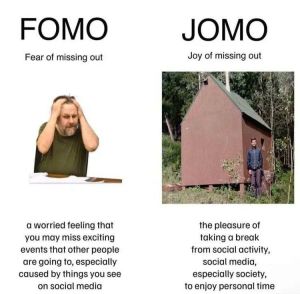JOMO
The Joy of Missing Out: Why JOMO Is better than FOMO
In an age where hyper-connectivity dominates every aspect of life, the Fear of Missing Out (FOMO) has become a cultural phenomenon. FOMO—the anxiety-inducing feeling that others are experiencing better opportunities or success while you’re not—drives many of us to chase trends, attend events, or make rushed decisions. But amidst this frenzy, a counter-movement has emerged: the Joy of Missing Out (JOMO).
JOMO isn't just the absence of FOMO; it's a mindset shift. It's about appreciating what you have, trusting in the opportunities that will come, and letting go of the fear that you’re falling behind. Whether it's missing out on the crypto bull run, skipping a bus, or opting out of a night out with friends, JOMO allows you to embrace peace and patience.
JOMO vs. FOMO: The Key Difference
While FOMO thrives on anxiety and comparison, JOMO is rooted in contentment and trust in the future. Instead of worrying about what you’re missing, JOMO encourages you to focus on what truly matters in the moment.
FOMO:
- Feels like urgency and pressure.
- Fueled by comparison and social media.
- Leads to impulsive decisions or regret.
JOMO:
- Feels like calm and acceptance.
- Allows for mindful decision-making.
- Focuses on personal priorities and long-term goals.
When JOMO Is Better Than FOMO
While FOMO might occasionally push you to seize valuable opportunities, many situations are better approached with JOMO. Here are some examples:
1. Missing the Crypto Bull Run
The cryptocurrency market is infamous for its volatility and hype cycles. When prices soar, the FOMO can be overwhelming. Many rush to buy at the peak, fearing they’ll miss the "next big thing."
Why JOMO is better:
- Recognize that markets are cyclical. Bull runs come and go, and there will always be another opportunity to invest wisely.
- Avoid buying into hype-driven markets where prices are inflated, preventing potential losses when the bubble bursts.
- JOMO allows you to focus on long-term financial goals rather than chasing short-term trends.
2. Missing the Bus or Train
Picture this: you’re running to catch a bus but miss it by seconds. The initial frustration might trigger FOMO—what if being late ruins your plans?
Why JOMO is better:
- Missing the bus could give you unexpected downtime to relax, reflect, or even catch a better ride.
- It helps shift your mindset from "this was my only chance" to "there will be another bus"—a metaphor for the endless opportunities in life.
3. Skipping a Social Event
Ever felt pressured to attend a party or event just because "everyone else will be there"? FOMO convinces us that missing out will make us feel excluded or irrelevant.
Why JOMO is better:
- Prioritize your energy and time. Missing one event won’t erase friendships or opportunities for connection.
- Enjoy the calm of staying in—read a book, watch your favorite show, or simply rest.
- JOMO allows you to prioritize quality over quantity in your social life.
4. Passing on High-Stakes Opportunities
Whether it’s a lucrative job offer, a trendy investment, or a once-in-a-lifetime event, FOMO pushes us to say "yes" out of fear we’ll never get another shot.
Why JOMO is better:
- Understand that opportunities are abundant. Missing one doesn’t mean you’re doomed to stagnation.
- JOMO empowers you to assess whether the opportunity aligns with your values and goals.
5. Ignoring Social Media Highlights
Social media is the ultimate FOMO factory. Friends traveling to exotic destinations, influencers boasting lavish lifestyles, and peers achieving milestones—it can all feel overwhelming.
Why JOMO is better:
- Social media often shows a curated version of reality, not the whole picture.
- JOMO lets you focus on your journey without comparing it to others’.
The Mental Health Benefits of JOMO
Adopting a JOMO mindset isn’t just practical—it’s transformative for mental health. Here’s how it helps:
- Reduced Anxiety: Letting go of FOMO means fewer sleepless nights over things you can’t control.
- Increased Focus: With JOMO, you focus on the present rather than chasing fleeting trends.
- Greater Contentment: JOMO encourages gratitude for what you have instead of longing for what you lack.
- Mindful Decision-Making: Without the pressure of FOMO, decisions are made with clarity and purpose.
How to Embrace JOMO in Everyday Life
- Practice Gratitude: Take time to appreciate what you have instead of longing for what you don’t.
- Say "No" with Confidence: Recognize that declining opportunities is a form of self-care.
- Set Long-Term Goals: Focus on where you want to go rather than the distractions along the way.
- Limit Social Media: Reduce exposure to FOMO triggers by taking breaks from social media.
- Trust the Process: Believe that opportunities will arise when the time is right.
Conclusion
The Joy of Missing Out is more than just a trendy phrase; it’s a philosophy that encourages mindfulness, patience, and trust in the abundance of opportunities life offers. Whether it’s the crypto bull run, the bus, or the party of the year, JOMO reminds us that missing out is often a blessing in disguise.
By embracing JOMO, we learn to live in the present, make better decisions, and focus on what truly matters—because sometimes, the best opportunities come to those who wait.
